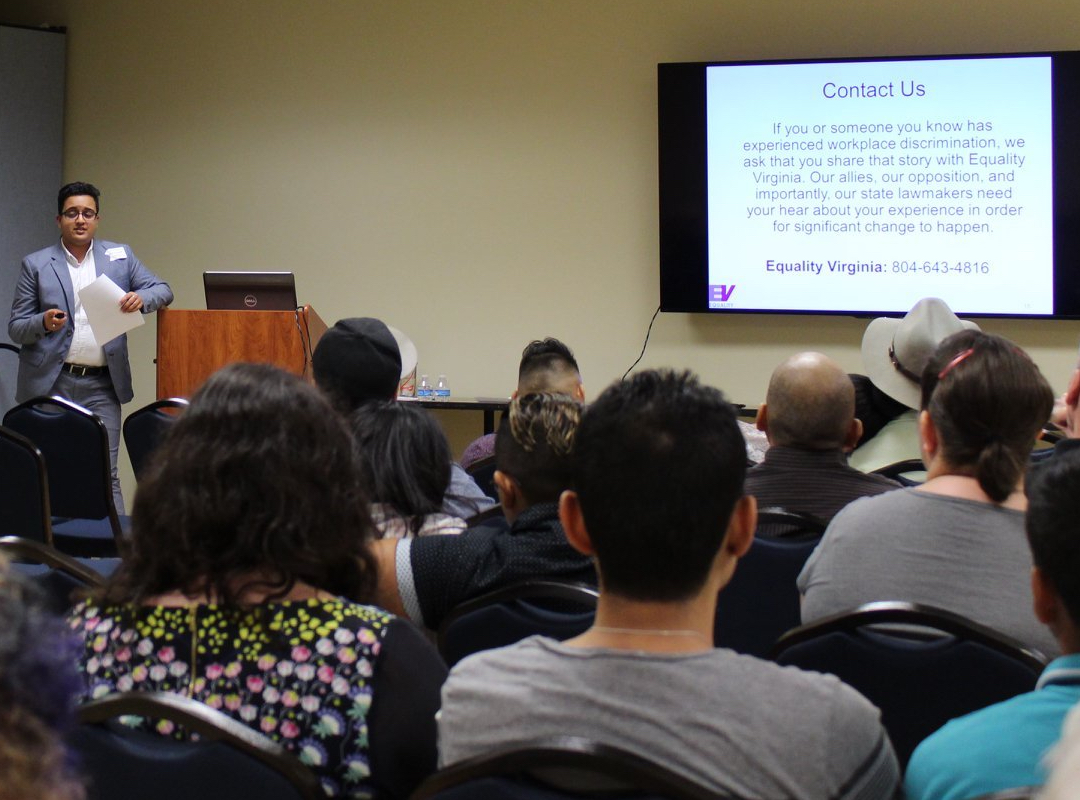
My time as an intern with Equality Virginia (EV) had a major impact on me. Thanks to the Beth Garrett Memorial Internship Grant I received from the Women's Center, I was able to take on an unpaid internship with EV’s Transgender Visibility Initiative. The financial support covered a great deal of what were going to be logistical barriers, including the cost of living in Charlottesville and commuting to downtown Richmond. Most importantly, this grant allowed me to focus my energy on my rewarding Equality Virginia experience and contribute to their mission as, “the leading statewide, non-partisan advocacy, outreach and education organization seeking equality for LGBT Virginians.”
I worked with the Transgender Programs Coordinator and the Deputy Director to assist: the Capacity Building Program, the Transgender Advocacy Speakers Bureau, and the Transgender Information and Empowerment Summit. The Capacity Building Program builds community by providing financial assistance to grassroots transgender resource and support groups across Virginia. The Transgender Advocacy Speakers Bureau does outreach to religious organizations on transgender identity and the impact of their voice and vote on our community. Finally, the Transgender Information and Empowerment Summit is a central hub for resources and education, and the largest conference in the area for transgender people and their allies.
My time at Equality Virginia bolstered my passion to travel down a career path that focuses on advocating for the equal respect and dignity of marginalized people.
The core practices behind these three standing programs are to strengthen transgender people to face the challenges of discrimination, and to show the Commonwealth our stories and encourage non-transgender people to be in solidarity with our community both as people and as a government. EV serves as a cornerstone of advocating for transgender equality. My exposure to an organization that conducts its actions based on the value of connection within and around the LGBTQ+ community was extraordinarily impactful. It gave me hope to see the personal and political power of bringing visibility to transgender issues, and it encouraged to be a more authentic person both now and in my future career.
In my role as an intern, I was able to assist first with these three programs, and then I had the responsibility of completing two other long term projects. The first was mapping out a strategy to encourage Virginian health systems to change their policies to be more adequately affirming of their LGBTQ+ employees and patients. I had the opportunity to connect with the Human Rights Campaign’s Healthcare Equality Project, Equality Texas, and the Virginia Department of Health. In the end, I developed a plan to conduct strategic outreach to healthcare executives and health systems to address healthcare policies including non-discrimination and staff training, patient services and support, employee benefits and policies, and patient and community engagement.
For the short term, I also was able to develop an interactive online map indicating the LGBTQ+ friendliness of different hospitals across Viginia for the Equality Virginia website. In the long term, the policy strategy will be utilized to first make sure all hospitals are compliant with federal non-discrimination laws, and next work to address community and hospital specific needs.
The financial support of the Beth Garrett Memorial Internship Grant covered a great deal of what were going to be logistical barriers and enabled me to take on an unpaid internship.
The second project I assisted with was developing a comprehensive curriculum and presentation on employment readiness to be used at the Transgender Information and Empowerment Summit. The primary focuses of the presentation were how to manage a name change and visible gender transition on the job, preserve professional experiences from prior to transitioning, and stand up to workplace discrimination both personally and legally. I had the opportunity to present my work at Shenandoah University in Winchester, Virginia in July. It was a great experience because I was able to test drive the presentation for an audience of 25 people and receive feedback to improve it. It also carried a lot of meaning for me because Winchester, Virginia is my hometown. It was was personally restorative to find members of my community and present to them a well researched claim to equal treatment in that location that was previously blatantly unsafe.
I have walked away from my time at Equality Virginia with continued professional development, and a bolstered passion to travel down a career path that focuses on advocating for the equal respect and dignity of marginalized people. There is much to be done both in policy and law, and I remain continually devoted to starting my Master’s of Public Administration and to my upcoming Law School application process. The impact Equality Virginia has on the Commonwealth is impressive, and I see that much of their work relies on the insights, research, and knowledge afforded to them from legal entities and policy researchers. As I continue through school, I am committed to finding my place in the process of creating equality under the law and in our communities.

